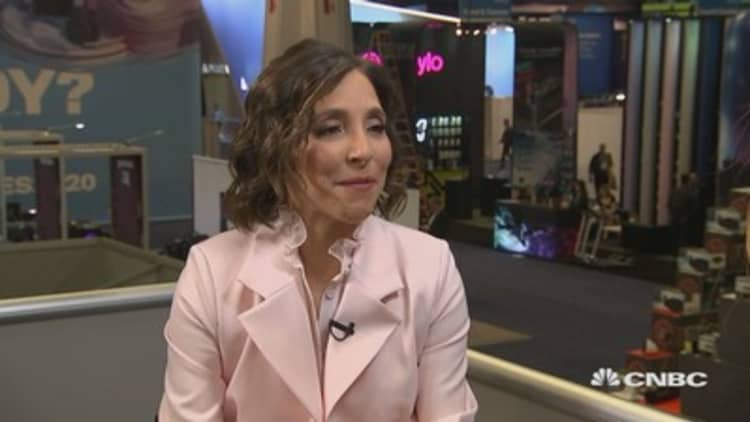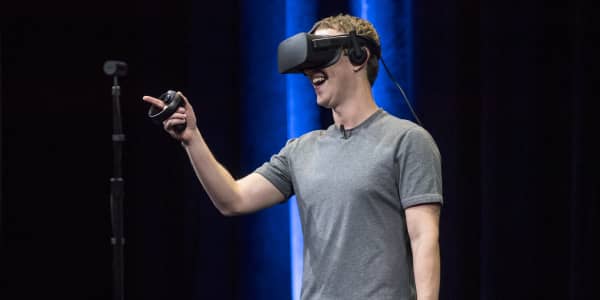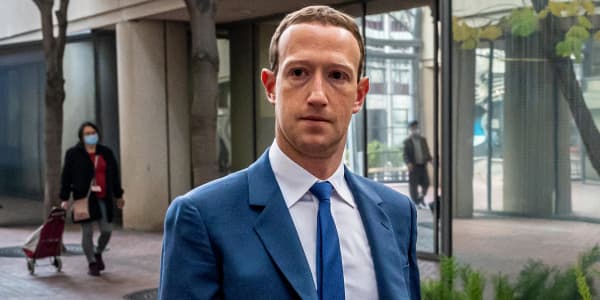
LAS VEGAS — The annual Consumer Electronics Show isn't just about the latest gadgets and giant, paper-thin TVs. It's also a crucial event for advertisers to figure out how to spend billions of dollars every year. It's where media and tech companies present the latest ad tools to lure brands.
The annual tech conference that kicks off the year also kicks of the negotiations between major brands and their ad agencies and the media companies, which continue through the TV Upfronts and Digital Newfront Presentations in the spring. This year, the conversation is dominated by the rise of ad-supported streaming, with NBCUniversal's Peacock launching in April, along with mobile video app Quibi, from Jeffrey Katzenberg and Meg Whitman.
Ahead of NBCUniversal unveiling details of Peacock at its investor day next week, the company announced ONE PLATFORM, which are new tools for advertisers to buy ads and measure their impact across digital and linear TV. The media giant says the one-stop-shop platform will have as broad a reach as Facebook or Google-owned YouTube every month, reaching 211 million adults ages 18 and up. And the platform will include ads on Peacock.
"It's really just shocking to imagine that the buying and selling or the trading of TV advertising hasn't changed since it began," Linda Yaccarino, NBCUniversal's chairman of ad sales and client partnerships said in an interview with CNBC at CES this week. "So now with the ONE PLATFORM you'll be able to take the large scaled audiences that NBCUniversal has. If you think about it in 2020 alone, NBC will produce 110,000 hours of premium content across every one of our screens. Now, finally, the advertiser can access those audiences, just the way the consumer interacts with all that content."
Michael Kassan, CEO of advertising advisory firm MediaLink, said as TV ratings decline with consumers shifting to streaming, there's increasing demand from brands to reach consumers on new streaming platforms.
"Marketers are standing back and saying, 'What about us?'" Kassan said. "There's this call for the advertisers: If people are going to be enjoying content over the top, direct to the consumer in a streaming fashion, there's got to be a place for advertising."
Peacock will be the biggest ad-supported streaming launch, as NBC looks for an opportunity to move away from the increasingly crowded subscription streaming space. With the recent Disney+ and Apple TV+ launches last fall and HBO Max coming up in May, attention is now shifting to the opportunity in ad-supported alternatives to pay services.
Amazon is building an ad-supported streaming service in IMDb TV. Sources tell CNBC that Hulu is looking at eventually offering a free, ad-supported version of its app, as it used to. Viacom — now known as ViacomCBS — bought ad-supported Pluto TV last year. Comcast has had talks about acquiring ad-supported Xumo to bolster Peacock, The Wall Street Journal reported last month. And then there are free apps like Tubi, which are independent.
Tubi CEO Farhad Massoudi, said his company is the world's largest ad-supported video-on-demand service. It announced 20 million monthly active users in June, and in September reported that its users had streamed 132 million hours of content. With over 20,000 movies and TV shows licensed from Hollywood studios, the app is available on over 25 devices, from Roku to Amazon FireTV. Peacock will pose new competition to Tubi, but Massoudi said there's room for a range of players.
"The average household will subscribe to a limited number of subscription services," Massoudi said. "What we offer is a complementary service with a massive library of content, a subset of which is relevant to you…. There's a huge need for consumers who want more content but don't want to pay more."
Yaccarino said Peacock is responding to demand from advertisers to get the reach of digital platforms without the risk of not necessarily knowing what content ads are running next to on the likes of Facebook or Google.
"They have developed terrific targeting capabilities where marketers can really really target audiences. But there's an unfortunate trade off," Yaccarino said. "They don't have the premium content that a company like NBCUniversal has. So what the one platform does is take the digital and targeting capabilities that they've grown accustomed to from the tech platforms and apply it to the massive scale of premium content that's always brand safe so they get the best of both worlds."
Kassan said platforms such as Peacock and Tubi will draw advertisers largely from TV, as they look to compensate for the decline in viewing on traditional TV.
"I would argue that if it's ad-supported streaming, it's TV in a different form, but it is still TV," Kassan said. "Do I think the money is going to still continue to come from other areas like print and the like? For sure."
Expect more content, viewers, and advertising to shift to the streaming space, Kassan said.
"Everybody will rise to the need to continue to have content linked with advertising and marketing messages," Kassan said. "That inextricable link has existed for a long time. I think it's going to be here to stay."
Disclosure: Comcast owns NBCUniversal, the parent company of CNBC.





